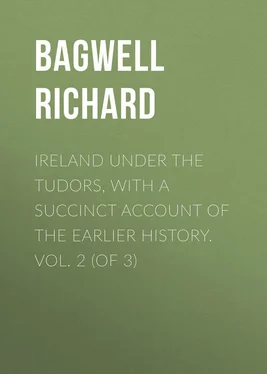Richard Bagwell - Ireland under the Tudors, with a Succinct Account of the Earlier History. Vol. 2 (of 3)
Здесь есть возможность читать онлайн «Richard Bagwell - Ireland under the Tudors, with a Succinct Account of the Earlier History. Vol. 2 (of 3)» — ознакомительный отрывок электронной книги совершенно бесплатно, а после прочтения отрывка купить полную версию. В некоторых случаях можно слушать аудио, скачать через торрент в формате fb2 и присутствует краткое содержание. Жанр: foreign_antique, foreign_prose, Историческая проза, на английском языке. Описание произведения, (предисловие) а так же отзывы посетителей доступны на портале библиотеки ЛибКат.
- Название:Ireland under the Tudors, with a Succinct Account of the Earlier History. Vol. 2 (of 3)
- Автор:
- Жанр:
- Год:неизвестен
- ISBN:нет данных
- Рейтинг книги:4 / 5. Голосов: 1
-
Избранное:Добавить в избранное
- Отзывы:
-
Ваша оценка:
- 80
- 1
- 2
- 3
- 4
- 5
Ireland under the Tudors, with a Succinct Account of the Earlier History. Vol. 2 (of 3): краткое содержание, описание и аннотация
Предлагаем к чтению аннотацию, описание, краткое содержание или предисловие (зависит от того, что написал сам автор книги «Ireland under the Tudors, with a Succinct Account of the Earlier History. Vol. 2 (of 3)»). Если вы не нашли необходимую информацию о книге — напишите в комментариях, мы постараемся отыскать её.
Ireland under the Tudors, with a Succinct Account of the Earlier History. Vol. 2 (of 3) — читать онлайн ознакомительный отрывок
Ниже представлен текст книги, разбитый по страницам. Система сохранения места последней прочитанной страницы, позволяет с удобством читать онлайн бесплатно книгу «Ireland under the Tudors, with a Succinct Account of the Earlier History. Vol. 2 (of 3)», без необходимости каждый раз заново искать на чём Вы остановились. Поставьте закладку, и сможете в любой момент перейти на страницу, на которой закончили чтение.
Интервал:
Закладка:
Sir Henry Radclyffe, the most highly placed and best connected officer in Ireland, was summoned before Arnold to give fuller answers to Bermingham’s charges. He refused to go back to a period before the last general payment, but offered to wait on the Commission at any time after one hour’s notice, and begged that his soldiers might not be paid in his absence. Well might Radclyffe exclaim, ‘fiat justitia,’ when this common measure of justice was denied to him. Dixe was ordered to settle with Sir Henry’s company according to their own report. He obeyed; but took the precaution to have some of the Commissioners present, and declined to be bound by the results of such a monstrous order. It was hardly worth while to brand the character of the Queen’s officers, and to destroy the discipline of her troops for the sake of 10 l. , saved in the payment of a company of fifty. Radclyffe asked for a passport, and even offered to be tried by his own soldiers. Both requests were refused, and the Commissioners, who seem to have surrendered themselves to Bermingham’s guidance, declared that if fraud appeared on the face of the incriminating document drawn up by him, they would force Radclyffe to give the details which he had already refused. He was made to appear about 6,000 l. in debt, nearly half of which was on account of Irishmen enlisted above the number officially allowed. The accused officer was then committed to prison, and Arnold, having undertaken to see his men paid, refused to settle the tradesmen’s bills for necessaries, alleging that all should fall on the captains. There may have been great negligence, but the Lord Justice did not venture to accuse Radclyffe of any false statement; and it must be admitted that, whatever his faults, he had managed to keep Leix and Offaly quiet. As much could not be said for Arnold, whom the English Council gently rebuked for taking such an extreme course with an officer of high rank, a Privy Councillor, and a man of family. There could be no objection to detaining him in Ireland if necessary, but he might have been left at liberty. Cecil and Leicester, after privately examining the voluminous and contradictory reports, declared themselves puzzled in some things, and advised Arnold to take a good many of the Irish Council into his confidence. They reminded him that Dixe, with whom he appeared unable to agree, was chosen for a man of honesty and ability. What Leicester and Cecil could not fully understand at the time, we shall hardly be able to clear up now. That Radclyffe had committed irregularities was not denied, that they were much smaller both in amount and in kind than Arnold supposed may be gathered from the fact that he was afterwards allowed to give a bond for 600 l. to repay all moneys overpaid to him, if the balance should be against him at a final closing. Sir George Stanley gave a similar bond for 300 l. Nicholas Heron, another captain whom Arnold treated with great rigour, was afterwards knighted, and died in the enjoyment of the Queen’s favour. 81 81 For Radclyffe’s case, see his letter to Cecil, Jan. 31, 1565, and the memorial of his other letters, Feb. 4; Bermingham to Cecil, Feb. 24; Answer to the Commissioners by the Earl of Sussex; Auditor Dixe to Cecil, Jan. 17 and 26. Dixe says he was not disliked, because he kept himself ‘in a mean and quiet state.’ See the Queen’s letter to Lord Deputy Sidney, July 22, 1567.
While Arnold was occupied in exposing, and perhaps exaggerating the defects of military administration, the optimist Cusack was trying to keep Shane O’Neill in good humour. ‘Sir Thomas Cusack’s peaces’ became a byword in official circles. The last was made on the basis of leaving Shane all the glories of the O’Neills until the Queen gave him his father’s title. He was not to be brought before the chief governor against his will, and the disputes between English and Irish in the North were to be referred to arbitration. The Queen had made up her mind to brook the fact of a great O’Neill; but she positively refused to confirm the articles exempting him from attending on the Viceroy, and referring all to arbitration. Shane then declared that he would have all or none; but he signed a temporary agreement for the pacification of the borders, and he appears to have kept it for a time. Cusack, who was never tired of singing Shane’s praises, wished to have the Great Seal affixed to the original treaty; but the Privy Council dared not mention it to Elizabeth, the alterations being deemed necessary for her honour. That saved, there was every desire to humour the tyrant of the North. Elizabeth said she thought she had yielded enough, but was willing to have Shane’s disputes with the Baron of Dungannon’s sons decided in the next Irish Parliament. Shane dared to claim Lady Frances Radclyffe as having been ‘appointed to him by the Queen’s Majesty,’ and the Privy Council were afraid to say more than that the question must be left till Sussex reached the Court. How Lady Frances would have fared as Shane’s wife may be inferred from the way in which he treated his mistress. The Countess of Argyle, the accomplished lady who had left her husband for his sake, was chained by day to a little boy, and only released when wanted to amuse her master’s drunken leisure.
Lord Robert Dudley, mindful of their old sport together, advised the chieftain to do some notable service, and thus deserve the royal favour. He answered that the Scots were rebels and traitors, who usurped the Queen’s lands and revenues in the North, and that he would drive them all out of Ireland for no greater reward than the pay of forty men. In other words, he would gladly have had the Queen’s help in adding the MacDonnell lands to his own. 82 82 Articles between Cusack and O’Neill, Nov. 18, 1563. The following is the article struck out by the Queen: – ‘Non est habendum pro violatione pacis si non accedat personaliter ad gubernatorem, antequam intelligat an is est illi amicus et favorabilis an non, et si aliqua contentio oriatur inter Angliam et Hiberniam a boreali parte, quod probi viri eligantur ab utraque parte ad dirimendum has controversias sine pacis violatione.’ Truce between Cusack and O’Neill, March 1, 1564; the Queen to Cusack, June 24, 1564; Privy Council to same, April 2; Cusack to Cecil, March 22; Randolph to same, Dec. 24 (S.P., Scotland ); Cusack to Dudley, June 9; O’Neill to Lord Justice and Council, Aug. 18, 1564: – ‘Ipse autem et mei non intelleximus in hac boreali parte majores rebelles et proditores Celsitudini Reginæ quam Scotos qui absque Suæ Celsitudinis consensu usurpant.’
Cusack’s anxiety to please Shane was so great that he had no feeling left for O’Donnell, whose fate might well have moved the hardest heart. Seven years before, he told the Queen, O’Neill when hard pressed by the Government had been glad enough to take refuge in Tyrconnel, to marry his daughter, to profess loyalty to the Queen, and to swear eternal friendship to his hospitable host. O’Donnell had been glad to hear his son-in-law talk so, and said that he would befriend him only as long as he was loyal. Then Shane had taken to intriguing with his clansmen, and probably, if we may judge by the sequel, with his father-in-law’s wife. After his treacherous capture O’Donnell was bound hand and foot, an iron collar round his neck being tightly chained to the gyves on his ankles. Night or day he could neither lie down nor stand up. ‘When he perceived,’ said the victim, ‘that I could not be undone after this manner, he thought to torment me after another manner, to the intent that he might have all my jewels, and so he caused the irons to be strained upon my legs and upon my hands so sore that the very blood ran down on every side of mine irons, insomuch that I did wish after death one thousand times.’ No Christian or Turk, he thought, had ever been treated worse, and besides his personal wrongs not less than 500 people of some condition, and at least 14,000 of the poor, had lost their lives through O’Neill’s cruelty. His son Con, whose cousins delivered him to Shane, had been induced by torture to promise the surrender of Lifford. The tribesmen refused to give it up, and Shane threatened to strike off his prisoner’s leg. While Con daily expected death, his tormentor blockaded Lifford with earthworks, and his cattle ate down the green corn for miles round. The castle was taken, and all Tyrconnel was then at Shane’s mercy. 83 83 O’Donnell to the Queen, May 14 and Oct. 24, 1564; Wrothe to Lord R. Dudley, July 23. The deed for the surrender of Lifford is dated July 12. Old O’Donnell was released before April 17.
Интервал:
Закладка:
Похожие книги на «Ireland under the Tudors, with a Succinct Account of the Earlier History. Vol. 2 (of 3)»
Представляем Вашему вниманию похожие книги на «Ireland under the Tudors, with a Succinct Account of the Earlier History. Vol. 2 (of 3)» списком для выбора. Мы отобрали схожую по названию и смыслу литературу в надежде предоставить читателям больше вариантов отыскать новые, интересные, ещё непрочитанные произведения.
Обсуждение, отзывы о книге «Ireland under the Tudors, with a Succinct Account of the Earlier History. Vol. 2 (of 3)» и просто собственные мнения читателей. Оставьте ваши комментарии, напишите, что Вы думаете о произведении, его смысле или главных героях. Укажите что конкретно понравилось, а что нет, и почему Вы так считаете.












